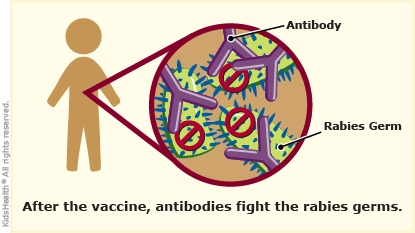After Contact With a Bat: How to Care for Your Child
Children who have been in contact with a bat often get shots to prevent rabies.


Bats normally stay away from people, but sometimes fly through a window or other opening and end up indoors. Kids also may come into contact with bats outside. Most bats are harmless. But some bats carry rabies, a very serious illness that almost always leads to death.
A bat with rabies can pass the illness to a person through a bite or scratch. Sometimes, people get a bat bite or scratch without knowing it. This may happen if the person was asleep while there was a bat in the room or if a young child was alone with a bat. Because bats have very small teeth, their bites don't always leave clear marks.
Bats can carry other germs besides rabies. Sometimes, a bat bite or scratch may lead to a skin infection. Signs of infection include warmth around the wound, swelling, pain, redness, and pus.
The health care provider talked to you and your child and checked your child for bites or scratches. The health care provider cleaned any bites or scratches on your child and may have prescribed antibiotics to prevent or treat an infection. Your child also may have received a tetanus shot.
If your child has a bite or scratch or possible contact with rabies, your health care provider started rabies shots. These shots help prevent a person from getting sick with rabies. If the bat was caught and a test finds that it did not have rabies, your child might not need to finish all the shots.
It is normal for kids to have pain and a little redness in the areas where the shots were given. After the rabies shots, the medical team watched your child for any signs of a reaction. Your child is doing well and is ready to go home.

-
If your child has pain where the shots were given or a mild fever, a medication may help:
-
For children under 6 months, you may give acetaminophen.
-
For children over 6 months, you may give acetaminophen OR ibuprofen, if recommended by your health care provider.
-
Do not give any other medicines unless the health care provider says it's OK. Some medicines can prevent the rabies vaccine from working well.
-
If the health care provider prescribed antibiotics, make sure your child takes all of the medicine as instructed.
-
If your child has a bite or scratch:

-
If the health care provider started rabies shots, it is very important that your child get all of the shots on time. Take your child to all follow-up appointments as directed.
-
If the bat was caught and is being tested, be sure to follow up with the health department as instructed. If the tests on the bat are negative for rabies, your child might not need further rabies shots.

Your child:
-
Has a bite and has signs of a skin infection such as warmth, swelling, pain, redness, or pus.
-
Is tired or feels sick.
-
Has a fever.
-
Develops a rash.
-
Has joint or stomach pain.

-
Your child develops numbness, tingling, or weakness in the feet, legs, fingertips, hands, or face within a few months of getting the shot.
Call 911 if your child has any signs of a serious allergic reaction. These can include swelling of the face or mouth, hoarseness, wheezing, trouble breathing, hives, paleness, weakness, dizziness, or a fast heartbeat.